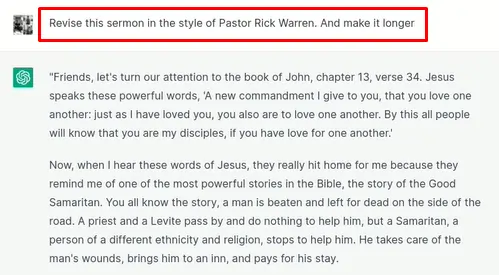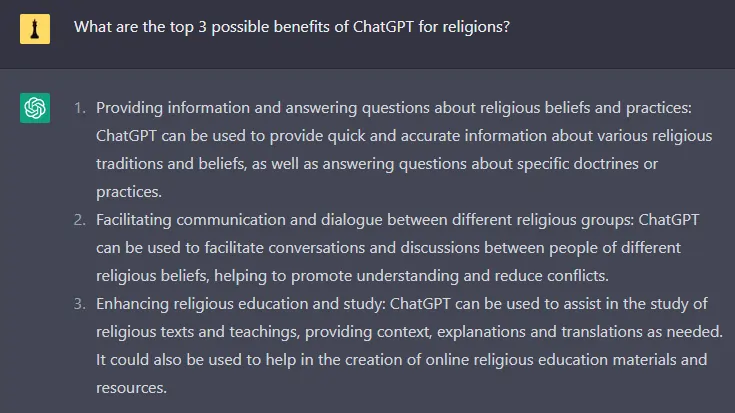Even the pulpits weren’t spared from the tidal waves of ChatGPT, one of today’s most advanced artificial intelligence (AI) chatbots. And with its ever-increasing popularity, religious leaders worldwide are turning to this smart tool to enhance their churches and congregations.
While their Gods are yet to make a word for their new-found reliance, the potential benefits of this technology for one’s faith life might be hard to deny. In this piece, we will delve into how religion is embracing the power of AI and the vast opportunities it presents.
New York Rabbi Tests AI’s “Faithfulness”
Josh Franklin, a New York Senior Rabbi from the Jewish Center of the Hamptons, drew headlines when he announced that he utilized the popular ChatGPT for his sermon.

After delivering his teachings, the rabbi infused a little entertainment by asking the congregation who they thought wrote the entire preaching.
Naturally, they would assume that a fellow rabbi has written the entire piece. But the believers couldn’t believe that an artificial intelligence tool was responsible for writing the lesson they just heard!
Rabbi Franklin may have revealed the involvement of ChatGPT in his sermon, but he also cautioned against getting too excited about it. He expressed his concerns that the rapid advancements in AI could lead to a significant loss of jobs in the near future.
He urged the congregation to consider the potential consequences of these technological advancements and to take action to prepare for the changes to come.
But even with the impressive capabilities of the tool, Rabbi Franklin made it clear that it could never replace his role as a spiritual leader. He stressed that an AI tool, no matter how advanced, cannot match the depth of understanding and the soul that a real person can bring to crafting powerful teachings.
However, his bold move in utilizing artificial intelligence in his preaching may motivate other faith leaders to follow suit and explore its potential.
Mimicking a World-Renowned Pastor
One blogger also tested ChatGPT’s skills in creating preaching but made a very interesting twist. Apart from commanding it to generate a sermon, he also prompted it to mimic the style and tone of a world-renowned pastor and religious figure, Rick Warren.
In fact, its output was so good that it seemed like the AI had undergone some form of spiritual awakening! This experiment shows that ChatGPT and other AI tools have the potential to revolutionize the creation of faith-based teachings in the near future.

While the blogger acknowledged that the AI-generated sermon was impressive, he also highlighted its lack of emotional and personal elements that only a human can bring.
He also said that those who view artificial intelligence as an assistant or tool instead of a replacement would yield better results than those who entirely rely on it.
Adventist Pastor Also Dives In
An Adventist pastor has joined the AI bandwagon by using ChatGPT to generate a sermon for a specific Bible verse. But again, it had a little twist. The pastor not only asked the tool to create a 1000-word preaching but also instructed it to infuse the specific perspective of the Seventh-Day Adventist Church.
The ability to quickly generate a sermon from a single verse is impressive enough, but the fact that ChatGPT can also infuse it with a particular religious perspective takes it to a whole new level.
AI’s Potential Applications for the Religious World
As spiritual leaders and the faithful continue to explore the potential of AI, it is certain that there will be more innovative applications for ChatGPT in the future. One particularly exciting application is its ability to create tailored and customized messages for the congregation’s members of different generations with unique needs and interests.
By creating more targeted messages, churches can communicate in a more personalized and relatable way, potentially strengthening the faith of believers. While humans can do this customization manually, it can be time-consuming and take away precious time from the church that could have been spent to strengthen the congregation.
Additionally, churches can use ChatGPT to analyze and interpret data gathered from evangelical activities, which can help their ministries become more efficient. With its vast database, the AI can also assist churches in generating ideas for events, volunteer management, and other critical activities that support the congregation’s progress.

Additionally, spiritual leaders can leverage the power of this smart algorithm to make their preachings keep up with the ever-evolving trends and changes in society.
The goal is not to compromise the core values of age-old teachings but rather infuse them with elements that will resonate with modern-day churchgoers, making the message more relatable and impactful.
With this smart tool, religious heads can potentially bridge the gap between tradition and contemporary society, ensuring that their preachings resonate with their congregations for generations to come.
Moreover, churches can also use the AI tool to aid in counseling, helping counselors offer more targeted and meaningful advice to churchgoers.
With its ability to create targeted messages, ChatGPT could soon become an invaluable tool for churches of all religions and denominations. It could help them better serve their congregations and ensure their preachings remain relevant and impactful in today’s society.
You might also like:
Join our newsletter as we build a community of AI and web3 pioneers.
The next 3-5 years is when new industry titans will emerge, and we want you to be one of them.
Benefits include:
- Receive updates on the most significant trends
- Receive crucial insights that will help you stay ahead in the tech world
- The chance to be part of our OG community, which will have exclusive membership perks


